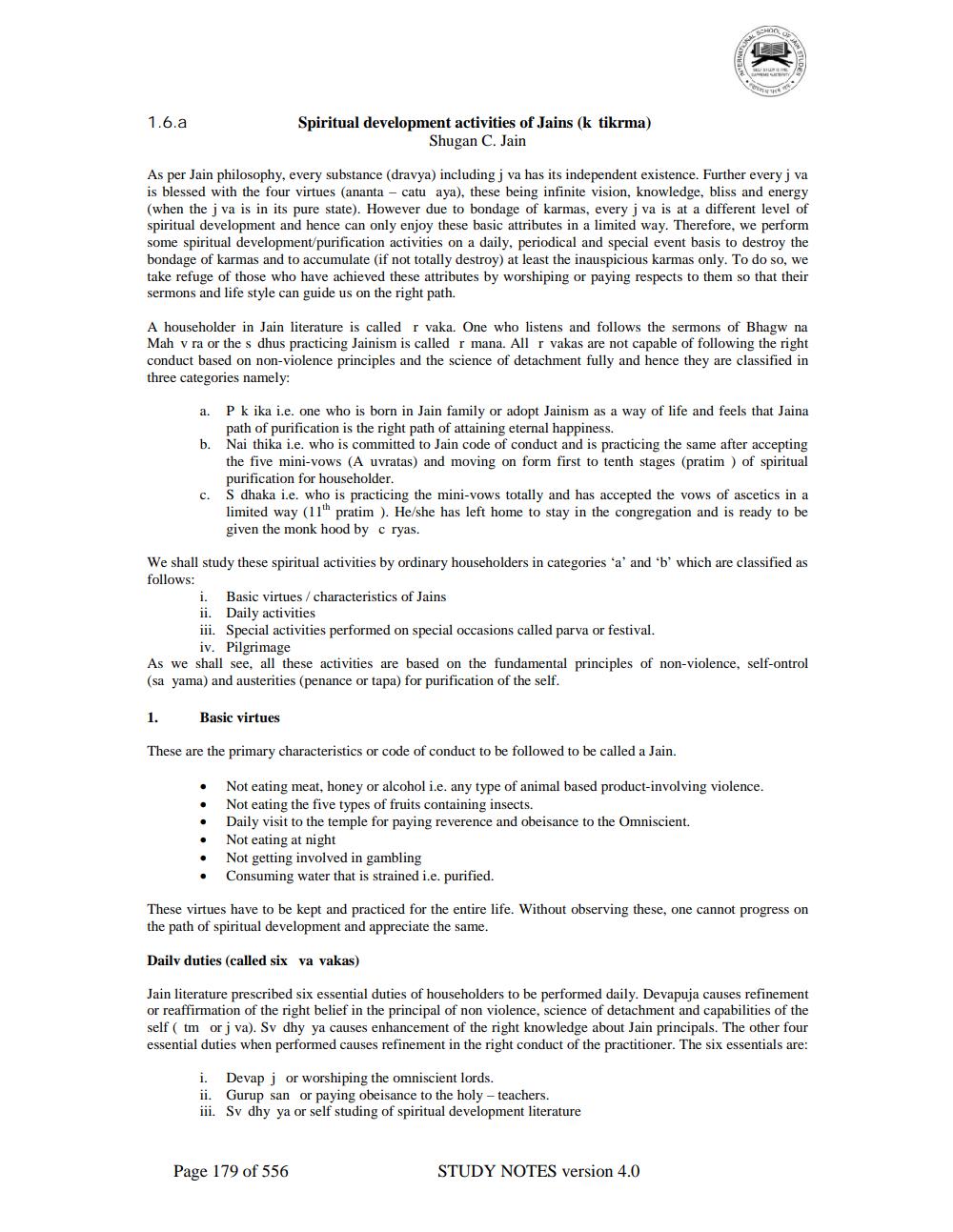________________
1.6.a
Spiritual development activities of Jains (k tikrma)
Shugan C. Jain
As per Jain philosophy, every substance (dravya) including j va has its independent existence. Further every j va is blessed with the four virtues (ananta - catu aya), these being infinite vision, knowledge, bliss and energy (when the j va is in its pure state). However due to bondage of karmas, every j va is at a different level of spiritual development and hence can only enjoy these basic attributes in a limited way. Therefore, we perform some spiritual development/ purification activities on a daily, periodical and special event basis to destroy the bondage of karmas and to accumulate (if not totally destroy) at least the inauspicious karmas only. To do so, we take refuge of those who have achieved these attributes by worshiping or paying respects to them so that their sermons and life style can guide us on the right path.
A householder in Jain literature is called r vaka. One who listens and follows the sermons of Bhagw na Mah v ra or the s dhus practicing Jainism is called r mana. All r vakas are not capable of following the right conduct based on non-violence principles and the science of detachment fully and hence they are classified in three categories namely:
a. Pk ika i.e. one who is born in Jain family or adopt Jainism as a way of life and feels that Jaina
path of purification is the right path of attaining eternal happiness. b. Nai thika i.e. who is committed to Jain code of conduct and is practicing the same after accepting
the five mini-vows (A uvratas) and moving on form first to tenth stages (pratim) of spiritual
purification for householder. c. S dhaka i.e. who is practicing the mini-vows totally and has accepted the vows of ascetics in a
limited way (11" pratim). He/she has left home to stay in the congregation and is ready to be given the monk hood by c ryas.
We shall study these spiritual activities by ordinary householders in categories 'a' and 'b' which are classified as follows:
i. Basic virtues / characteristics of Jains ii. Daily activities iii. Special activities performed on special occasions called parva or festival.
iv. Pilgrimage As we shall see, all these activities are based on the fundamental principles of non-violence, self-ontrol (sa yama) and austerities (penance or tapa) for purification of the self.
1.
Basic virtues
These are the primary characteristics or code of conduct to be followed to be called a Jain.
Not eating meat, honey or alcohol i.e. any type of animal based product-involving violence. Not eating the five types of fruits containing insects. Daily visit to the temple for paying reverence and obeisance to the Omniscient. Not eating at night Not getting involved in gambling Consuming water that is strained i.e. purified.
•
These virtues have to be kept and practiced for the entire life. Without observing these, one cannot progress on the path of spiritual development and appreciate the same.
Daily duties (called six va vakas)
Jain literature prescribed six essential duties of householders to be performed daily. Devapuja causes refinement or reaffirmation of the right belief in the principal of non violence, science of detachment and capabilities of the self ( tm orj va). Sv dhy ya causes enhancement of the right knowledge about Jain principals. The other four essential duties when performed causes refinement in the right conduct of the practitioner. The six essentials are:
i. Devap j or worshiping the omniscient lords. ii. Gurup san or paying obeisance to the holy - teachers. iii. Sy dhy ya or self studing of spiritual development literature
Page 179 of 556
STUDY NOTES version 4.0




